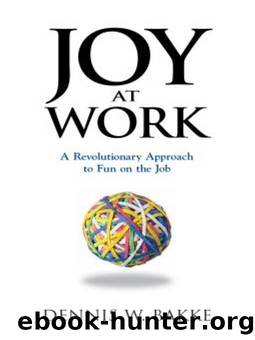Joy at Work by Dennis W. Bakke

Author:Dennis W. Bakke
Language: eng
Format: epub
Publisher: Pear Press
Published: 2010-08-23T00:00:00+00:00
While every organization would allocate its revenues differently than AES did, many would show a similar result regarding profits. A fairly small percentage of revenue generated by companies is allocated to shareholders in the form of profits. Investors are important to any organization, but most of the time they get only a small piece of the corporationâs revenue. This reinforces my argument that the interests of shareholders should not be paramount. Other stakeholders receive more significant economic benefits from the corporation than shareholders.
Maximizing value for just one stakeholderâi.e., shareholdersâis probably easier than creating value for all stakeholders. But just because itâs easier doesnât mean itâs right. Justice demands that companies balance the interests of every stakeholder and allocate a fair share of the rewards to each.
Because of the importance of each stakeholder to the success of AES, I changed the salutation in my letter in the annual report from âDear Fellow Shareholdersâ to âDear Friends.â For several years I included separate sections for our various stakeholders. I felt I owed each important group, not only shareholders, a report on how our business was conducted.
Creating economic value is a prerequisite to being a viable business, but the value created cannot be limited to shareholders. Shareholders do not âownâ a company in the way that I own my house. They are more akin to investors in an apartment building who receive a portion of the rental income after paying for maintenance, heating, security, and other expenses. Other stakeholders in the apartment buildingâthe renters, doormen, and superintendent, for instanceâalso receive benefits from the enterprise. Likewise, the stakeholders in a corporation deserve returns for the contributions they make to the companyâs effort to serve society. Value needs to be created for all major groups that assist the corporation in achieving its purposes. To sustain itself economically, a company needs to generate enough value over the long term to âpayâ stakeholders an amount consistent with their contribution to the enterprise. Giving an outsized return to any single stakeholder effectively cheats the other stakeholders.
We donât need businesses that primarily âadd value,â which is just another way to say making money for shareholders. Simply put, we need businesses that perform well. That means that they need to serve society by providing customers with a valuable service or product and make enough money to pay employees, banks, shareholders, governments, and other stakeholders what they deserve for their assistance in making the enterprise successful.
As Harvard Business School professor Lynn Sharp Paine says, âsuperior performance in todayâs world has both a moral and a financial dimension. â
We gave AES a moral dimension by making certain values and principles a central part of our purpose. It was a relatively new idea to me when we started AES, and Iâm sure many people in business find it strange and inappropriate even today. Why, they ask, should a profit-making organization put such emphasis on shared values instead of letting employees follow their own values in their personal lives?
This letter, which was sent to
Download
This site does not store any files on its server. We only index and link to content provided by other sites. Please contact the content providers to delete copyright contents if any and email us, we'll remove relevant links or contents immediately.
Hit Refresh by Satya Nadella(9110)
The Compound Effect by Darren Hardy(8909)
Change Your Questions, Change Your Life by Marilee Adams(7721)
Nudge - Improving Decisions about Health, Wealth, and Happiness by Thaler Sunstein(7682)
The Black Swan by Nassim Nicholas Taleb(7091)
Deep Work by Cal Newport(7044)
Rich Dad Poor Dad by Robert T. Kiyosaki(6581)
Daring Greatly by Brene Brown(6492)
Principles: Life and Work by Ray Dalio(6390)
Playing to Win_ How Strategy Really Works by A.G. Lafley & Roger L. Martin(6190)
Man-made Catastrophes and Risk Information Concealment by Dmitry Chernov & Didier Sornette(5984)
Digital Minimalism by Cal Newport;(5741)
Big Magic: Creative Living Beyond Fear by Elizabeth Gilbert(5729)
The Myth of the Strong Leader by Archie Brown(5482)
The Slight Edge by Jeff Olson(5400)
Discipline Equals Freedom by Jocko Willink(5361)
The Motivation Myth by Jeff Haden(5194)
The Laws of Human Nature by Robert Greene(5139)
Stone's Rules by Roger Stone(5066)
